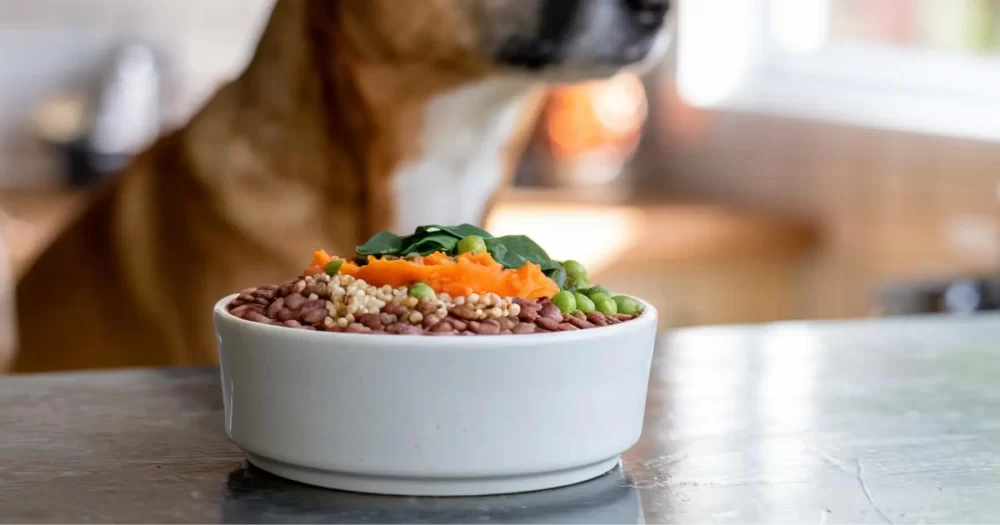- Benefits-of-Homemade-Dog-Food-for-Sensitive-Digestion-and-Allergies-Relief
- Understanding-Sensitive-Digestion-and-Allergies-in-Dogs
- Key-Ingredients-for-Homemade-Dog-Food-for-Sensitive-Digestion
- Step-by-Step-Guide-to-Preparing-Homemade-Dog-Food-for-Allergy-Relief
- Real-Life-Examples-and-Success-Stories
- Professional-Advice-and-Where-to-Find-Help
1. Benefits of Homemade Dog Food for Sensitive Digestion and Allergies Relief
Feeding your dog homemade food tailored to sensitive digestion and allergies relief offers numerous advantages over commercial diets. Many store-bought dog foods contain additives, fillers, and ingredients that can aggravate digestive issues or trigger allergic reactions. Homemade dog food allows pet owners to control every ingredient, ensuring a fresh, nutrient-rich diet free from common allergens such as wheat, corn, soy, or artificial preservatives.
Additionally, homemade meals can be adjusted to meet your dog's specific needs, improving nutrient absorption and reducing gastrointestinal discomfort. Dogs with sensitive digestion often suffer from symptoms like vomiting, diarrhea, gas, or skin irritations caused by food allergies, which can be effectively managed with carefully selected homemade recipes. This personalized approach not only improves your pet’s quality of life but also deepens the bond between you and your furry companion.
1.1 Long-Term Health Improvements
Over time, a homemade diet designed for sensitive digestion and allergies relief can lead to stronger immune function and better overall vitality. Reduced exposure to allergens means fewer flare-ups of skin conditions or digestive upset, which translates into fewer vet visits and less reliance on medications.
1.2 Enhanced Palatability and Enjoyment
Dogs are often more enthusiastic about fresh homemade meals, which can help stimulate appetite, especially in picky eaters or those recovering from illness. The variety of flavors and textures also keeps mealtime exciting and enjoyable for your dog.
2. Understanding Sensitive Digestion and Allergies in Dogs
Before preparing homemade dog food, it’s crucial to understand what sensitive digestion and food allergies mean for your pet. Sensitive digestion typically involves an impaired ability to break down certain ingredients, leading to symptoms like loose stools or stomach pain. Food allergies are immune responses triggered by specific proteins or additives found in dog food.
2.1 Common Allergens to Avoid
Proteins such as beef, chicken, dairy, and grains like wheat and corn are frequent culprits in canine allergies. Identifying the exact allergen often requires elimination diets or veterinary testing. Knowing these triggers allows you to avoid them and focus on safer ingredients.
2.2 Signs Your Dog May Need a Special Diet
Repeated gastrointestinal upset, persistent itching, chronic ear infections, or unexplained weight loss are signs your dog may benefit from a sensitive digestion dog diet. Early recognition and dietary changes are key to managing these conditions effectively.
3. Key Ingredients for Homemade Dog Food for Sensitive Digestion
Choosing the right ingredients is the foundation of an effective homemade sensitive digestion dog recipe. The goal is to provide balanced nutrition while minimizing allergens and irritants.
3.1 Easily Digestible Proteins
Novel proteins like duck, rabbit, or venison are excellent choices for dogs with allergies. These proteins are less likely to cause reactions compared to common meats. Fish such as salmon also provides omega-3 fatty acids, which support skin health and reduce inflammation.
3.2 Gentle Carbohydrates
Carbohydrates like sweet potatoes, pumpkin, and quinoa are well-tolerated and provide essential fiber that aids digestion. These alternatives to grains can help stabilize blood sugar and improve stool quality.
3.3 Supportive Additives and Supplements
Incorporating probiotics can enhance gut flora, improving digestion and immune defense. Additionally, adding vitamins and minerals ensures the homemade diet meets all nutritional requirements. Consulting with a veterinary nutritionist can help tailor supplements to your dog’s needs.
4. Step-by-Step Guide to Preparing Homemade Dog Food for Allergy Relief
Preparing homemade dog food doesn’t have to be complicated. Here is a detailed approach that balances nutrition and allergy management.
4.1 Planning and Ingredient Selection
Start by choosing proteins your dog hasn’t been exposed to or tolerated well in the past. Combine with gentle carbohydrates and a source of healthy fats. Avoid ingredients known to cause allergies.
4.2 Cooking and Preparation
Cook proteins thoroughly but avoid overcooking to preserve nutrients. Steam or bake vegetables and carbohydrates to maintain digestibility. Mixing ingredients in appropriate proportions ensures a balanced meal.
4.3 Portioning and Storage
Divide the food into daily portions to maintain freshness. Store in airtight containers in the refrigerator or freezer. Gradually introduce the homemade diet over 7–10 days, mixing with current food to reduce digestive upset.
4.4 Monitoring and Adjustment
Observe your dog’s response carefully, noting any improvements or adverse reactions. Adjust ingredients as needed, and consult your vet if symptoms persist.
5. Real-Life Examples and Success Stories
One notable story comes from a dog owner whose Labrador retriever suffered chronic itching and digestive issues for years. After switching to a homemade dog food plan emphasizing duck and sweet potatoes, the dog’s symptoms dramatically improved within weeks. The owner credits this diet for the dog's restored vitality and comfort.
Similarly, a small breed dog with dairy and chicken allergies experienced weight loss and lethargy. A customized homemade sensitive digestion dog recipe including rabbit, pumpkin, and probiotics helped stabilize digestion and boosted energy levels. These cases highlight how homemade dog food tailored to allergies relief can be transformative.
6. Professional Advice and Where to Find Help
Creating a safe and nutritious homemade dog food plan for sensitive digestion and allergies relief requires careful planning and knowledge. Consulting a veterinary nutritionist or your trusted vet is essential before making dietary changes.
For reliable products, ingredient sourcing, or personalized dietary advice, Hidden Brook Veterinary offers expert guidance and high-quality options tailored to dogs with special dietary needs. Their team can help you design a diet plan that meets your pet’s unique requirements and monitor progress over time.












